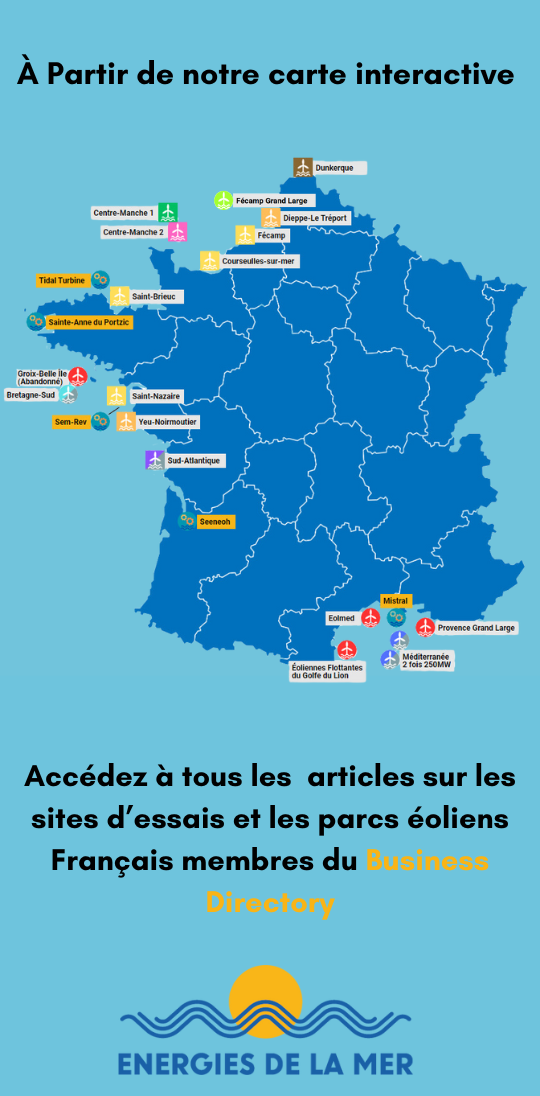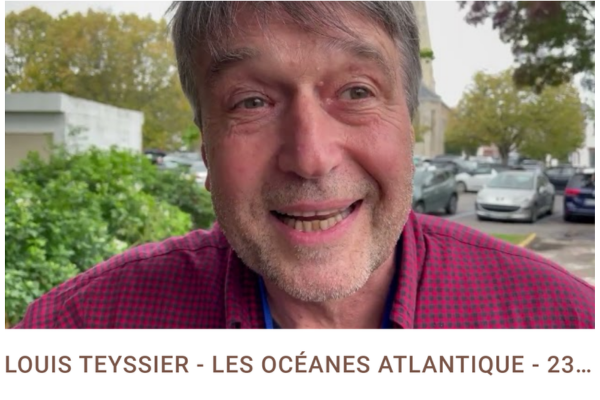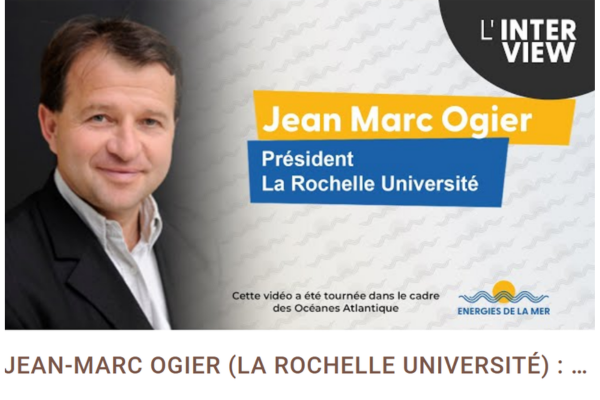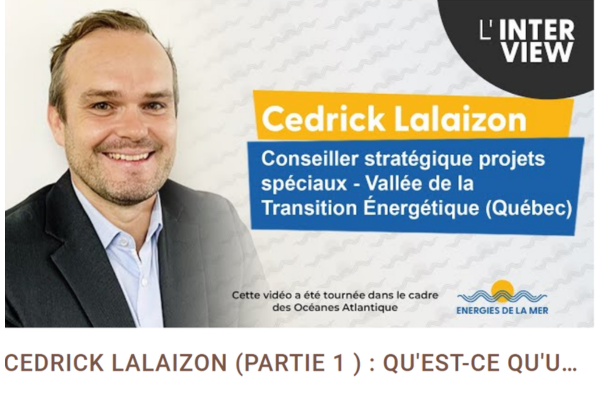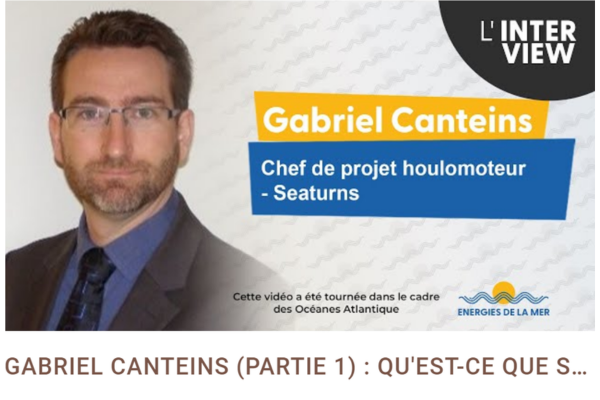France – Vendredi 14/06/2019 – energiesdelamer.eu. Pour ce poste de post-doc qui se dérule dans le cadre du programme de recherche MUSIWIND Project du WISE program ( Région Pays de la Loire ), les compétences recherchées chez le candidat sont : GEII, instrumentation, traitement de signal/algorithmie,…
Scientifiquement, le sujet vise à porter (sur plateforme embarquée), étendre et qualifier sous forme d’indicateurs des algorithmes pour le suivi de santé des éoliennes par analyse modale. Techniquement, le projet prévoit une intégration hardware/software de briques très innovantes (dont un des accéléromètres les plus sensibles au monde) couplées à une éolienne qu’un gestionnaire nous met à disposition.
Contater : Dr. Xavier Chapeleau (IFSTTAR Nantes, Email: xavier.chapeleau@ifsttar.fr) et/ou Dr. Laurent Mevel (Inria Rennes, Email: laurent.mevel@inria.fr);
Context:
To achieve a competitive price per kilowatt hour, the maximization of the energy production and the reduction of maintenance costs are two key issues for the operators of wind turbines. Structural Health Monitoring (SHM) is known as a promising solution to detect early damage and therefore to able to reduce maintenance costs [1]. By having damage indicators obtained by continuous monitoring throughout the lifetime of a wind turbine, operators could indeed anticipate and space maintenance operations. Today one of the challenges, especially for offshore wind turbine where the economic stakes are high, is to develop a reliable and cost-efficient SHM monitoring system that can make an efficient structural check of the wind turbine, in particularly of the foundation and the transition zone between the mast and the foundation, which are critical areas that are very difficult to inspect.
Objectives:
In the context described above, the project MusiWind aims at the development of a new system for monitoring the structural integrity of wind turbines and its qualification in real conditions (on-shore site test). The hardware and software developments will integrate a new low-noise accelerometer (developed by SERCEL) with a generic wireless platform PEGASE3 [2] (developed by IFSTTAR) on which innovative data analysis [3, 4, 5, 6].developed by the Ifsttar / Inria I4S joint research team should be embedded. These algorithms are based on statistical inference approach to extract structural information under ambient excitation. The originality of the project will be to implement and to develop identification methods as well as multi-varied damage indicators that merge data from sensors of different types and qualities, as well as the fusion of complementary physical characteristics.
In the framework of MUSIWIND project, the team i4S of IFSTTAR (http://www.sii.ifsttar.fr) and Inria (http://team.inria.fr/i4s/) is seeking for a talented postdoctoral research fellow. The hosting laboratory possesses strong expertise on the development of structural health monitoring system (from the sensors to the data processing). The candidate will both implement the new system proposed and investigate the relevance and the efficiency of a multi-varied approach.
Work description:
The Postdoc student will be in charge of:
- Electronic (hardware and software) integration and test of the new system monitoring in close collaboration of the electronic engineers of Ifsttar-Sii and Sercel teams.
- Implementation of SII (Stochastic Subspace Identification) algorithm for modal analysis.
- Post-processing of data already collected by a previous monitoring system and comparison with those obtained by the new system for modal analysis under ambient excitation.
- Development of a monitoring algorithm based on the fusion of multi-varied data.
- Study of the relevance and the efficiency in real conditions of the multi-varied approach.
Candidates profile:
– Doctor in embedded system electronics, informatics or similar - Strong background in embedded system and data processing - Skills in instrumentation, applied mathematics, numerical computation (C, python) are preferred. – Applicants must be self-driven, highly motivated and able to work autonomously towards the objectives of the project.
– Excellent interpersonal and communication skills.
Applications are welcomed until the end of August 2019. The interested candidates should contact rapidly either Dr. X. Chapeleau or V. Le Cam or Dr. Laurent Mevel with a full CV and a reference letter.
Les organismes concernés sont : IFSTTAR, INRIA, Sercel, Valemo, Valorem, Wise
Bibliography: [1] MathewL.Wymorea, JeremyE.VanDam, HalilCeylan, DajiQiao, A survey of health monitoring systems for wind turbines. Renewable and Sustainable Energy Reviews, 2015, 52, pp. 976–990. [2] Vincent Le Cam, Michael Döhler, Mathieu Le Pen, Ivan Guéguen, Laurent Mevel. Embedded subspace-based modal analysis and uncertainty quantification on wireless sensor platform PEGASE. EWSHM – 8th European Workshop on Structural Health Monitoring, Jul 2016, Bilbao, Spain. [2] Michael Döhler, Falk Hille, Laurent Mevel. Vibration-based monitoring of civil structures with subspace-based damage detection. Erika Ottaviano, Assunta Pelliccio, Vincenzo Gattulli. Mechatronics for Cultural Heritage and Civil Engineering, 92, Springer, pp.307-326 2018, Intelligent Systems, Control and Automation: Science and Engineering. [3] Guillaume Gautier, Laurent Mevel, Jean-Mathieu Mencik, Roger Serra, Michael Döhler. Variance analysis for model updating with a finite element based subspace fitting approach. Mechanical Systems and Signal Processing, Elsevier, 2017, 91, pp.142 – 156. [4] Philippe Mellinger, Michael Döhler, Laurent Mevel. Variance estimation of modal parameters from output-only and input/output subspace-based system identification. Journal of Sound and Vibration, Elsevier, 2016, 379, pp.1-27. [5] Michael Döhler, Palle Andersen, Laurent Mevel. Variance computation of modal parameter estimates from UPC subspace identification. IOMAC – 7th International Operational Modal Analysis Conference, May 2017, Ingolstadt, Germany. (Best innovative paper)
Publicités Google :


